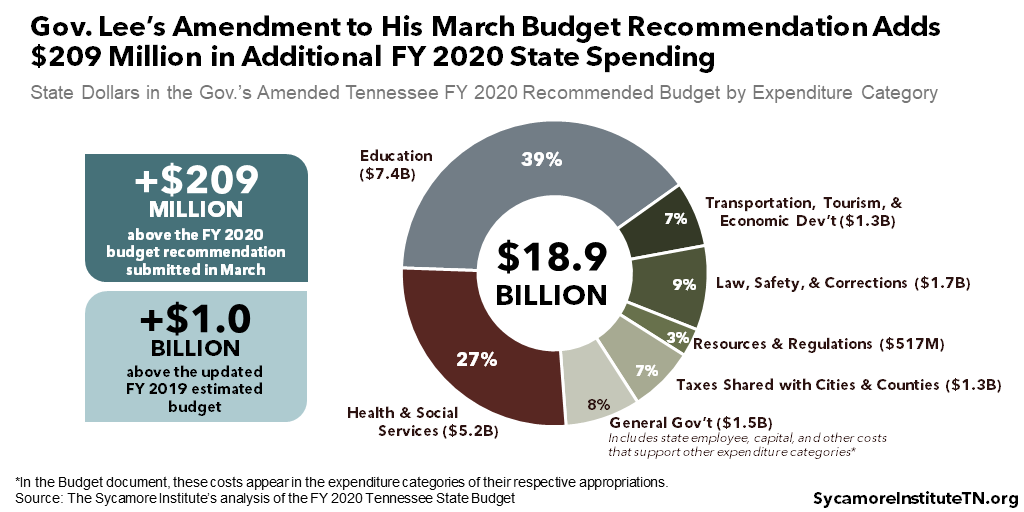Last week, Governor Lee proposed an amendment to his budget recommendation for FY 2020, which starts July 1, 2019. These revisions update the original budget plan the governor rolled out in March, reflecting new information about revenue collections, program needs, and legislative action.
The administration amendment marks one of the final steps in the process to get next year’s budget approved by the legislature (which will likely be one of the General Assembly’s final actions before adjourning for the year).
Key Takeaways
- The governor’s budget amendment increases state expenditures by $208.7 million relative to the recommendation submitted in March.
- The largest change is the addition of $144.6 million for TennCare from the program’s dedicated hospital assessment.
- The amendment also includes a reallocation of $24.7 million in non-recurring funds from the education savings account (ESA) proposal to Hepatitis C treatment for the state prisoners.
- Funding for most of the additional spending comes from a $60.9 million increase in current revenues expected to roll over to the next fiscal year as non-recurring revenue.
Figure 1

Changes to Proposed Spending
The governor’s budget amendment increases FY 2020 state expenditures by $208.7 million relative to the recommendation submitted in March — including $6.1 million in recurring state dollars, $60.9 million in non-recurring state spending, and $141.8 million in state dollars earmarked for a specific purpose.
With the amendment, the FY 2020 recommended budget totals $18.9 billion from state revenue sources. This is an increase of 5.6% (or $1.0 billion) over estimates for the current fiscal year.
TennCare Hospital Assessment
The amendment’s largest expenditure change is a $144.6 million increase for TennCare, associated with an increase in the earmarked hospital assessment. The state first began assessing hospitals in FY 2011 in order to partially fund the state’s share of TennCare costs. It has brought in just under $450 million annually. Because TennCare is an entitlement, the federal government covers about 65% of the program’s costs. As a result, the assessment draws down about $840 million in federal funds each year.
The additional state dollars proposed in the amendment are expected to draw down another $290 million in federal funds in FY 2020. (3) According to information provided by TennCare, these additional dollars will be used to help cover:
- Expected program cost increases,
- An increase in the state’s match rate (from 34.13% in FY 2019 to 34.79% in FY 2020), and
- Additional payments to hospitals to offset the cost of unreimbursed care for the underinsured and uninsured.
Education Savings Account Reallocation
The amendment also includes a reallocation of $24.7 million in non-recurring funds from the education savings account (ESA) proposal. The FY 2020 budget proposed in March included $25.3 million in new recurring spending for ESAs. Separate ESA legislation defining the details of the program is still making its way through the legislative process; however, significant spending is not expected in the program’s first year. (4) As a result, the administration amendment proposes a $24.7 million non-recurring reduction for FY 2020.
This approach retains a $25.3 million placeholder in the recurring base budget for ESAs. If approved by the legislature, this smooths the path to fund the program with at least $25.3 million in future years.
Hepatitis C Treatment for Prisoners
The $24.7 million non-recurring ESA reduction is reallocated to Hepatitis C treatment for the state prison population. Hepatitis C is a potentially fatal liver disease caused by the blood-borne Hepatitis C virus. It can be spread through shared needles, tattoos, piercing, and sexual contact, for example. Incarcerated populations are at higher risk for having and spreading the Hepatitis C virus. (5)
Approximately 21% of prisoners in state facilities (4,663 individuals) had Hepatitis C as of June 30, 2018 — compared with about 1.7% of all U.S. adults in 2013-2017. (6) (7) Treatments introduced in the last decade can cure most Hepatitis C cases but are costly — ranging from $26,400 to $95,000. (8) (9) To manage these costs, the Department of Correction (TDOC) has capped its annual spending on these drugs — the subject of a pending class action lawsuit against TDOC. (10) The proposed funds are expected to treat some — but not all — state prison inmates with Hepatitis C.
Other Notable Expenditure Increases
Other notable increases relative to the governor’s March budget proposal include:
- +$11.3 million non-recurring for 37 targeted grants to non-profits and local communities. These grants range from $1.5 million for Jobs for Tennessee Graduates to $5,000 for the Boys and Girls Club of Jackson.
- +$10.0 million non-recurring for a Memphis Riverfront Development Grant.
- +$8.3 million non-recurring for the Capital Outlay program, which supports the improvement and maintenance of state buildings.
- +$8.3 million for a new Radioactive Material Training and Education Center. The funding represents the first year of a two-year request.
- +$4.2 million for the development of a MyTN app — including $1.6 million in recurring funds and $2.6 million non-recurring.
- +$4.0 million in recurring funds to support transportation costs for individuals with mental illness being involuntarily committed to a treatment facility. Under current law, local sheriffs have much of the responsibility for these costs. (11)
- +$4.0 million in non-recurring funds for “efficiency initiatives.”
Changes to Revenue Expectations
Funding for most of the additional spending comes from a $60.9 million increase in current revenues expected to roll over to FY 2020 as non-recurring revenue and the TennCare hospital assessment increase (discussed above). The governor’s March budget recommendation estimated that about $804.6 million would be available at the end of the current fiscal year. The additional $60.9 million is a result of program underspending ($50.0 million) and additional revenues not previously budgeted ($17.5 million) minus $6.6 million in new supplemental appropriations for FY 2019.
What Happens Next?
The Tennessee House and Senate Finance Committees are making their own incremental changes to the budget based on amendments and legislation proposed by state lawmakers. The legislature is expected to pass the budget in late April or early May and adjourn shortly after.
References
Click to Open/Close
- State of Tennessee. FY 2019-2020 Tennessee State Budget. [Online] March 4, 2019. https://www.tn.gov/content/dam/tn/finance/budget/documents/2020BudgetDocumentVol1.pdf.
- Tennessee Department of Finance and Administration. 2019-2020 Administration Budget Amendment Overview. [Online] April 15, 2019. Accessed on April 15, 2019 from https://www.tn.gov/finance/fa/fa-budget-information/fa-budget-overviews_presentations.html.
- Tennessee General Assembly Fiscal Review Committee. Fiscal Memorandum: SB 474-HB 771. [Online] March 24, 2019. http://www.capitol.tn.gov/Bills/111/Fiscal/FM0736.pdf.
- —. Fiscal Memorandum: HB 939-SB 795. [Online] April 15, 2019. http://www.capitol.tn.gov/Bills/111/Fiscal/FM1308.pdf.
- U.S. Centers for Disease Control and Prevention. Fact Sheet: Hepatitis C & Incarceration. [Online] October 2013. https://www.cdc.gov/hepatitis/hcv/pdfs/hepcincarcerationfactsheet.pdf.
- Tennessee Department of Correction. FY 2018 Statistical Abstract. [Online] October 2018. [Cited: April 17, 2019.] https://www.tn.gov/content/dam/tn/correction/documents/StatisticalAbstract2018.pdf.
- Hofmeister, Megan, et al. Estimating Prevalence of Hepatitis C Virus Infection in the United States, 2013‐2016. Hepatology, Vol. 69, Issue 3 (Mar 2019). [Online] November 6, 2018. https://aasldpubs.onlinelibrary.wiley.com/doi/full/10.1002/hep.30297.
- Bruen, Brian, et al. High-Cost HCV Drugs in Medicaid: Final Report. Report for Medicaid and CHIP Payment and Access Commission (MACPAC), Contract # MACP16406T2, Milken Institute School of Public Health. [Online] January 2017. [Cited: January 30, 2018.] https://www.macpac.gov/wp-content/uploads/2017/03/High-Cost-HCV-Drugs-in-Medicaid-Final-Report.pdf.
- Andrews, Michelle. Hepatitis C Drug’s Lower Cost Paves Way for Medicaid, Prisons to Expand Treatment. Kaiser Health News. [Online] October 3, 2017. [Cited: January 30, 2018.] https://khn.org/news/hepatitis-c-drugs-lower-cost-paves-way-for-medicaid-prisons-to-expand-treatment/.
- American Civil Liberties Union of Tennessee, Disability Rights Tennessee and Branstetter, Stranch & Jennings, PLLC. Class Action Complaint against Tennessee Department of Corrections. [Online] June 25, 2016. [Cited: January 30, 2018.] http://www.aclu-tn.org/wp-content/uploads/2016/07/Graham-v.-Parker-Complaint_Redacted.pdf.
- University of Tennessee County Technical Assistance Service. Transportation of Persons with Mental Illness. [Online] April 17, 2019. http://eli.ctas.tennessee.edu/printpdf/book/export/html/1274.

